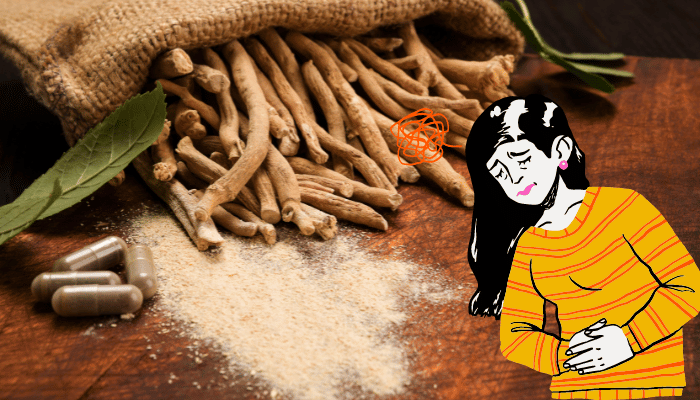
Polycystic Ovary Syndrome (PCOS) is a common hormonal disorder that affects women of reproductive age. It is characterized by irregular periods, high levels of androgen hormones, and the presence of multiple cysts on the ovaries. PCOS can cause a range of symptoms such as acne, hair loss, weight gain, and fertility problems. While there is no cure for PCOS, there are natural remedies that can help manage the symptoms. One such remedy is Ashwagandha, a herb widely used in Ayurveda medicine. In this article, we will explore how Ashwagandha can help with PCOS and how to take it.
How does it help in PCOS?
Ashwagandha has been shown to have a range of health benefits, including reducing stress, improving cognitive function, and boosting immunity. Along its several health benefits for female, Ashawagandha is very effective natural remedy for PCOS. Here is how :-
Regulates Hormones
Ashwagandha has adaptogenic properties, which means it can help regulate hormone levels in the body. It can help reduce the levels of androgen hormones, such as testosterone, which are often elevated in women with PCOS. By regulating hormone levels, Ashwagandha can help alleviate the symptoms of PCOS, such as acne, hair loss, and irregular periods.
Reduces Inflammation
Inflammation is a common factor in many health conditions, including PCOS. Ashwagandha has anti-inflammatory properties that can help reduce inflammation in the body. This can help alleviate the symptoms of PCOS, such as insulin resistance and weight gain.
Improves Insulin Sensitivity
Insulin resistance is a common feature of PCOS. Ashwagandha has been shown to improve insulin sensitivity in the body, which can help regulate blood sugar levels and reduce the risk of type 2 diabetes.

How does it work ?
Ashwagandha works by regulating the endocrine system, which is responsible for producing and regulating hormones in the body. It has adaptogenic properties, which means it can help the body adapt to stress and maintain homeostasis. This adaptogenic effect is due to the presence of compounds such as withanolides, alkaloids, and saponins.
One of the primary mechanisms by which Ashwagandha can help with PCOS is by reducing insulin resistance. Insulin resistance is a common feature of PCOS and can lead to high insulin levels in the body. This, in turn, can stimulate the ovaries to produce more androgens, leading to symptoms such as acne, hair loss, and irregular periods. Ashwagandha can improve insulin sensitivity, which can reduce insulin levels and subsequently lower androgen levels.
Ashwagandha can also help reduce inflammation in the body. Inflammation can contribute to insulin resistance and other metabolic disorders associated with PCOS. Ashwagandha has been shown to have anti-inflammatory effects by reducing the levels of pro-inflammatory cytokines such as tumor necrosis factor-alpha (TNF-α) and interleukin-6 (IL-6).
Finally, Ashwagandha can help regulate cortisol levels, which is the primary stress hormone in the body. Women with PCOS often have higher cortisol levels, which can contribute to insulin resistance and other PCOS symptoms. Ashwagandha can reduce cortisol levels and improve the body’s response to stress, which can help alleviate PCOS symptoms.
When to take Ashwagandha for PCOS
The best time to take Ashwagandha for PCOS is in the morning or evening. You can take it with food or on an empty stomach, depending on your preference. It is recommended to take Ashwagandha consistently for at least 8-12 weeks to see results.
How to take Ashwagandha powder for PCOS
Ashwagandha is available in various forms, including powder, capsules, and tea. The recommended dosage for Ashwagandha powder is 1-2 teaspoons per day, mixed with warm water or milk. You can also add honey or other natural sweeteners to improve the taste. Ashwagandha capsules are available in different strengths, and the dosage may vary depending on the brand. It is essential to follow the recommended dosage on the label or consult with a healthcare professional before taking Ashwagandha.
How much Ashwagandha should you take for PCOS?
The optimal dosage of Ashwagandha for PCOS varies depending on the individual’s needs and the form of Ashwagandha being taken. As mentioned earlier, the recommended dosage for Ashwagandha powder is 1-2 teaspoons per day. However, it is best to consult with a healthcare professional to determine the right dosage for you.
Does Ashwagandha have side effects for PCOS?
Ashwagandha is generally safe and well-tolerated by most people. However, it may cause some side effects, such as digestive issues, nausea, and drowsiness. It is essential to start with a low dose of Ashwagandha and gradually increase it to avoid any adverse effects. Pregnant and breastfeeding women should avoid Ashwagandha, as there is not enough research to confirm its safety during pregnancy and lactation.
Ashwagandha PCOS study
Several studies have shown the potential benefits of Ashwagandha for PCOS. A study published in the Journal of Ethnopharmacology found that Ashwagandha root powder improved insulin sensitivity and reduced testosterone levels in women with PCOS. Another study published in the Journal of Complementary and Integrative Medicine found that Ashwagandha supplementation improved ovulation and pregnancy rates in women with infertility and PCOS. These studies suggest that Ashwagandha can be a useful natural remedy for managing PCOS symptoms.
In conclusion, Ashwagandha is a natural remedy that can help alleviate the symptoms of PCOS. It has adaptogenic properties that can help regulate hormone levels, reduce inflammation, and improve insulin sensitivity. Ashwagandha is available in various forms, including powder, capsules, and tea, and can be taken in the morning or evening, with or without food. However, it is essential to consult with a healthcare professional before taking Ashwagandha, especially if you have any pre-existing medical conditions or are taking medications.

Lifebing is driven by an unrelenting passion for promoting health and well-being, our team is wholly committed to curating exceptional content and immersive experiences.
